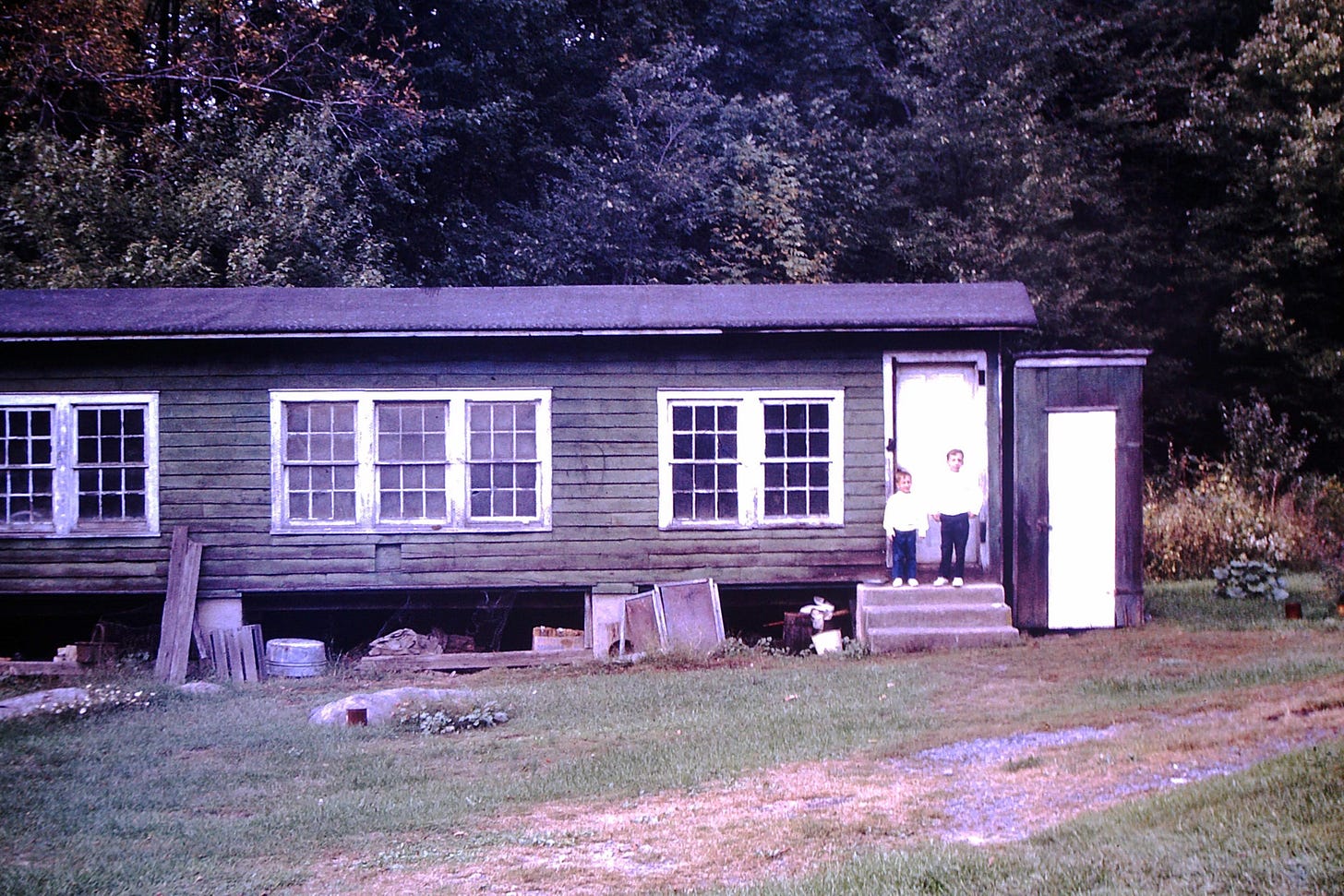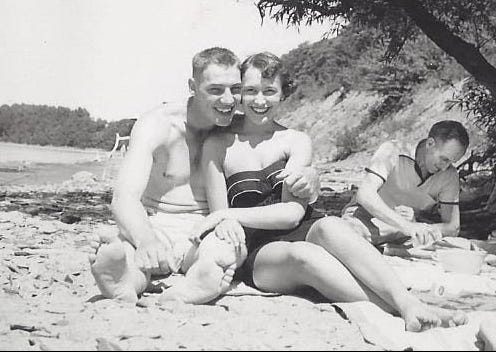In 1966, when I was in third grade, Dad, Randy, and I were hard at work fixing up the chicken coop and converting it into a workshop and two-car garage. We started early in the morning and worked all day.
One day, we were ripping up the floor and knocking out some walls. Dust from old chicken poop filled the air and made us cough. Around lunchtime, Mom walked over to us with a tray of sandwiches and a pitcher of lemonade. She wore shorts and a pink blouse. Her red lipstick accented her smile. “Are my men ready for lunch?” she asked.
I dropped a large piece of wood and said, “You bet. Thanks, Mom!”
Mom set the tray on a workbench Dad made of boards and sawhorses. “Thanks, honey!” Dad said.
“Hub, this looks fantastic. I can’t believe the progress you've made.”
Smiling, he said, “I couldn't do it without the boys.”
Mom kneeled between Randy and me, put her arm over our shoulders, and thanked us. Randy had a mouthful of peanut butter and jelly sandwich. I looked at Mom and smiled. Randy swallowed his food and did the same.
My parents met at Allegheny College in the fall of 1953. In short order, they announced their engagement. My grandmother disapproved. She was a nurse and wanted Mom to marry a sophisticated, prestigious doctor.
Dad was neither sophisticated nor prestigious. He grew up in Erie, Pennsylvania, very poor during the Great Depression. He got a scholarship for football and could sometimes come across brash and insensitive. They graduated from college and were married in May 1954, where they moved into a small apartment in Cleveland, Ohio.
Soon after Dad graduated, he was drafted. My parents had been married for under a year and now everything was on hold. He shipped off to Korea on a two-year deployment.
Mom moved back with her parents in Jamestown, New York. Dad objected to this plan. He knew my grandmother would dominate his new wife.
Crying, Mom said, “Hub, I can’t be alone for two years. I need support!”
My grandmother was strict and didn't allow Mom to go out with friends and socialize. She had no plans to date anyone, but that didn’t matter.
“Joanne, you are a married woman now, you cannot go out on the town.”
Because of her nursing background, Grandma noticed depression. Mom saw a doctor each week, and he prescribed Librium and Valium. Things improved, however Mom still felt isolated and missed my father.
Dad hated Korea. Three of his friends also got drafted, but each of them had better deployments. Two were stateside, and the other was sent to Germany. Dad slept in uncomfortable tents, the winters were freezing and the summers were stifling hot.
Mom and Dad stayed in contact with weekly letters, but they were not enough, Mom missed him, felt lonely and soon withdrew, sleeping until late in the day.
When Dad was discharged, he was eager to resume his life with Mom, they moved back to Cleveland where Dad landed a job at Warner & Swasey. I was born on February 21, 1957, the day before Mom’s birthday. She told me I was her birthday present.
At one point, I don’t remember exactly when Mom stopped delivering us lunch. I began to notice her sitting in her chair at the kitchen table, staring into the distance in her blue paisley bathrobe, smoking, and drinking black coffee. One day in the middle of the afternoon, I went into the kitchen to get some lemonade. There she was, in that same chair. I didn’t know it at the time, but this was when she started taking her Valium and Librium again.
“Hi Mom, I’m here to get some lemonade.”
She looked up, a weak smile on her face. “Hi dear. It’s in the fridge.”
I got a glass of lemonade and sat down next to her. “Mom, are you okay?”
“Yes, honey, I don’t have much energy these days.”
“Why is that?”
“I miss my friends from East Norriton, and this house is ancient. I’m alone all day.”
I actually thought something was wrong with her. I tried to make her feel better. “Well, we're working hard to fix the place up. I missed my friends at first, but this place is cool.”
Mom looked at me. “I know, honey, I’ll be fine.”
I didn’t understand why she was acting this way. Our house was wonderful. She ignored us more and more. Everyone except for Mom loved it here and it made me angry.
However, looking back, I now have more of an understanding of the situation. There was a grand plan. For $12,000, Dad purchased our dilapidated farmhouse on 26 acres of land. He planned to fix up the house, then sell it along with four acres for a profit. Then, he would build a large, modern home on the other side of our property. It was the only way Mom agreed to move to Quakertown, but her heart wasn’t really in it. As a nine-year-old boy, I understood none of this.
This is a scene from my upcoming book Motorcycle Stories - Finding forgiveness on the open road. It is the story of Scott, a young timid boy saving up and buying a motorcycle that becomes his lifelong love. He and his best friend Ross take motorcycle trips around the northeastern U. S. where Scott faces his fears and comes to grips with his drug addicted and abusive mother. For a complete list of excerpts, please see :
For more about the book, visit my website at https://www.scottocamb.com and subscribe to my Substack to stay informed about the book’s launch this fall.



Gosh, Scott. Your words have come from a very real place in your heart to describe a terrifically difficult situation for you, your mum and your family. Goosepimpling stuff. I want to say 'I'm really sorry', but also 'wow, well done'. I might have said this before but I can't wait for the book.
Clear, poignant images of your isolated mom. If only she'd had a car , a friend, a creative outlet, the depression might have been averted. To you, a child, there was lunch, and then there was no lunch. Children know when something is wrong, and feel so helpless. This is going to be a fine story, Scott.